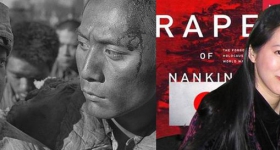I'm particularly excited to see Good Hair, not just because Rock is my favorite stand-up comedian, but because I've been exposed to the concept of good/bad African American hair since I was a kid, albeit from a peripheral perspective. For many years, my parents sold wigs, hair extensions, and hair products for African American female customers. The store they operated was in a working class neighborhood with a large black population but we rented a house in the predominantly white suburbs.
The prevalence of Koreans in the black hair care industry is well-documented, though I've yet to find any historical reference to why or how Koreans came to be so successful in an race-specific market of which they do not identify. [If anyone knows, please fill me in!] As for my parents, they simply had previous Korean immigrants to provide a business model for them and they ran with it.
I saw interactions between my parents and their customers that ranged from decade-long friendships to hostile screaming matches with racism coming from both parties, sometimes one-sided, sometimes simultaneously.
During arguments, inevitably a customer would state that they would never return to my parents' store, that they would only patronize black-owned stores from that point on. For non-blacks to open up shop in a black neighborhood, earning their livelihood from black customers, but living and paying taxes somewhere else is seen as draining a community's resources. And with my parents in the hair business, there was no ambiguity about who was profiting directly off of a specific racial group. Of course, as my parent's daughter, I saw the store as a means of food, rent, bills, and clothing. It wasn't until I was an adult that I understood where the store was positioned in terms of the American racial paradigm.
And of course a huge element of that paradigm is the standard of Eurocentric beauty and desirability. My family's financial survival depended on profits from an industry based on conforming to dominant notions of beauty. Not only that, but those notions of beauty are heavily racialized: natural hair texture of African Americans = bad, straight hair = good, and going from bad to good meant our family could make rent.
As a kid, not everything I saw in the store made sense to me; they just existed. Boxes of hair relaxer were bright purple and had pictures of a young black girl and her mother, hair straight and lips smiling. I knew that human hair was more expensive than synthetic, that braiding hair was only 99 cents. I saw these material objects but had no knowledge of their significance or applications once they left the store. I didn't realize how chemical relaxers actually worked or how long it took to get a weave done or the collective buying power of African American women. Sometimes I wondered why it was worth it to African American women to spend time and money for these products. I thought, "All this cash spent on fake hair in addition to make-up, toiletries, clothes, and handbags? How or why do they do it?" I never made the connection, but when I spent weekends working in the store with my grandmother, she would inspect my face and tell me to get my eyelids done. Too bad I didn't get the irony at the time.
When I go see Good Hair this week, I'm hoping to fill in some of those gaps and hear directly from the source (Rock interviews black women throughout the film, including several Hollywood actresses) about what is surely a complex cultural issue. Though this documentary discusses the experiences of African Americans, I think it'd be beneficial for all people to be in the audience, to draw the parallels to our own experiences, to deconstruct our own ideas of beauty (learned or individually formed), to understand that cultural trends or practices are not created in a vacuum, and to possibly let go of our own prejudgments and stereotypes.
Within communities of color, there's always this question of authenticity. Sometimes people who straighten their hair or get an eyelid fold or get an implant of some kind are automatically deemed sell-outs or whitewashed or mentally colonized. While reviews of Good Hair suggest that the documentary doesn't probe deep enough, I hope it hints at a beauty decision that is far more complicated than we think.
Beauty really is a pain.
Originally posted at The Antisocial Ladder.










Comments